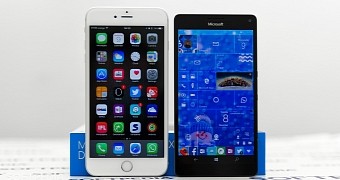Rumor has it that the iPhone 7 coming this year won’t bring significant changes as compared to the existing models, but on the other hand, Apple’s aiming for something really big for the 2017 version.
The iPhone 7 could come not only with an AMOLED display, a glass body, and wireless charging, but also with biometric authentication, a feature that was first introduced by Microsoft in Windows 10 on PCs and mobile devices.
While it’s a little bit too early to discuss the next-next iPhone, KGI Securities analyst Ming-Chi Kuo thinks that this model could finally adopt biometric authentication and offer some kind of face or eye recognition system that would add a new security layer to the device.
Microsoft’s Lumia 950 and 950 XL models already come with such features, and the company itself pushed very hard for biometric authentication, using it as one of the main reasons to make the switch to Windows 10 on both PCs and smartphones. While most devices rely on fingerprint scanning, high-end Lumia handsets bank on iris recognition, and it appears that Apple could soon borrow it too.
How the iris scanner works on Lumia 950/950 XL
Microsoft says that biometric authentication is impossible to break and uses a technology called asymmetric key cryptography implemented in some other products too.
The Lumia 950 series comes with an infrared camera and a secondary unit that automatically takes a photo of your eyes when you set up Windows Hello for the first time. When you attempt to authenticate, the infrared sensor lights up your face while the camera takes another photo of your face.
The original and the new photo are then compared using their hashes, and if there’s a match, you are granted access to the phone. The hash is securely stored on the device, so hacking should be impossible. Microsoft is working to improve the whole process and make it faster and more accurate, especially because it wants biometric authentication to work in all lighting conditions (it already does, but more improvements are always welcome).
Certainly, by the time the 2017 iPhone comes out, biometric authentication can improve significantly, so while many could rush to blame Apple for copying Microsoft, there’s no doubt that competition can only bring good things for customers.

 14 DAY TRIAL //
14 DAY TRIAL //